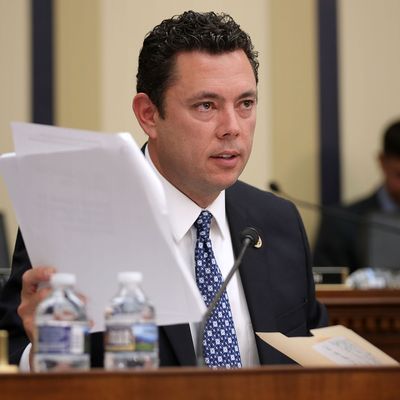
The House Republicans’ “civil war” is understandably attracting a lot of attention. But the truly unprecedented dynamic within the party right now is the complete submission of its investigatory apparatus. Devin Nunes, the chairman of the House Intelligence Committee, is essentially acting as an agent of the administration he is supposed to be investigating. (Nunes “works for the president, he answers to the president,” explained his colleague, Representative Ted Yoho, in a moment of unintentional candor.) Republicans on the House Ways and Means Committee voted this week not to compel the release of President Trump’s tax returns. And Jason Chaffetz, chairman of the House Oversight Committee, who claimed before the election that he had years of investigations on Hillary Clinton already teed up, is committing himself not to exercise any oversight over Trump’s flagrant and spreading self-enrichment.
A bipartisan norm for decades has required presidents to abjure any financial interest that could influence their decisions in office, however slight or remote. Jimmy Carter was famously required to sell off his peanut farm and subjected to a lengthy investigation ensuring the severance was absolute, to ensure he did not allow any pro-peanut bias to inflect his agenda. Trump has made a mockery of the ideal. He is not only holding onto his vast empire, and refusing to disclose its contours — which means his policies could be lining his pockets in ways about which the public has no inkling — but he is leveraging his power to make himself even richer. McKay Coppins asks Chaffetz if any of these actions strike him as the kind of thing he should exercise his oversight authority over. Chaffetz’s quotes are incredible:
One of the stories I flagged reported that online sales had skyrocketed for the First Daughter’s clothing line after Kellyanne Conway went on TV and urged Americans to “buy Ivanka’s stuff.” I asked Chaffetz if he was concerned about Trump reaping financial rewards from his presidency, but he just shrugged.
“He’s already rich,” Chaffetz said. “He’s very rich. I don’t think that he ran for this office to line his pockets even more. I just don’t see it like that.”
What about the recent New York Times story about Jared Kushner’s family exploring a $400 million deal with a Chinese company while he serves as a foreign policy adviser to the president—was that worthy of investigation?
“I don’t see how that affects the average American and their taxpayer dollars,” Chaffetz said. “Just the fact that a staff person’s family is making money? It’s not enough.”
He promised that Trump won’t get an entirely free ride under his watch. “Somebody’ll do something stupid at some point, and we’ll be all over it.” But, he added, “I think the people who voted for Donald Trump went into it with eyes wide open. Everybody knew he was rich, everybody knew he had lots of different entanglements … These other little intrigues about a wealthy family making money is a bit of a sideshow.”
What’s striking about these statements is how open-ended they are. In the above exchange, Chaffetz offers the following defenses:
1. Trump is already rich.
2. Trump enriching himself or his family in office does not affect the average American.
3. Chaffetz doesn’t think he ran with the purpose of getting richer.
4. The voters already knew he had entanglements.
The logic outlined by Chaffetz leaves no possibility for Trump to engage in corruption. What if Trump asks Congress to build a highway to make it easier for customers to access one of his hotels? What if foreign countries are giving Trump’s family preferred stock in return for favorable foreign-policy decisions? Reasons one–four supply sufficient reasons for the chairman of the House Oversight Committee to neither know nor care.






























